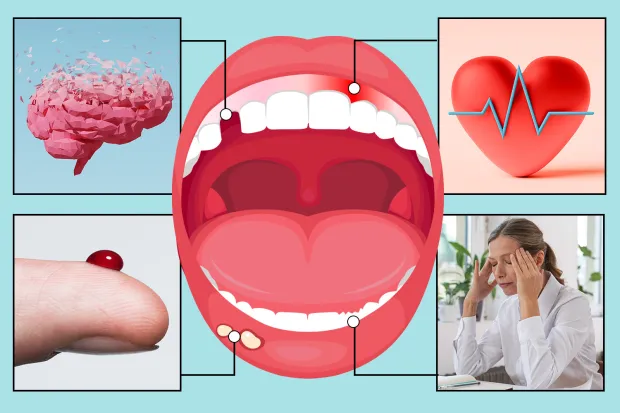Good dental health isn’t just about flashing a bright white smile.
The condition of your mouth is a signpost to your wider wellbeing, reflecting problems elsewhere as well as creating additional health issues if you don’t look after it.
“Getting your dental check-up isn’t just a chance to pick up on any problems with your teeth and gums,” says Dr Neil Sikka, chief dental officer for Bupa UK.
“Your dentist can also spot the signs of other problems when they look inside your mouth, as well as checking your jaw joints are healthy and for signs of oral cancers.
“It’s a real window on your overall health and we’re finding out more every day, as scientist look at how things like chronic inflammation in the mouth can impact other parts of your body – and why.”
Here, Neil tells ALEX LLOYD what your teeth could reveal about your health and wellbeing…
HEART DISEASE
People who have poor oral health, such as gum disease or tooth loss, have higher rates of cardiovascular problems like heart attack and stroke. The link has been found in multiple studies.
Theories vary as to why, but it is thought the bacteria that infect the gums to cause conditions like gingivitis also travel to blood vessels elsewhere in the body and do damage.
People don’t realise that inflamed gums have a heightened blood supply and also have peridontal pockets, which are gaps that grows between the gum and teeth, giving opportunities for bacteria to get into the bloodstream.
It could also be down to the inflammation triggered in the body and your immune system being under increased strain.
NUTRIENT DEFICIENCIES
Ulcers in the mouth can be a sign of anaemia, where you have too little iron, and some other vitamin deficiencies.
For patients with recurrent ulceration on the tongue or gums, if your dentist can’t find a dental issue causing it, I’d advise getting a blood test.
If it is not an iron deficiency, other culprits might be a lack of zinc, vitamin B12 or folate.
Hopefully, this could be treated by dietary changes and supplements.
RISK OF PREMATURE LABOUR
Pregnant women are entitled to free NHS dental treatment before birth and for a year after they have their baby.
This is because the hormone levels during this period can have a negative effect on your oral health.
A study also found that women who went into early labour recorded gum health scores four times lower than those who had a full-term birth. They had eight times more plaque as well.
The findings, published in the Journal of Clinical Periodontology, found that mums-to-be with untreated tooth decay or fillings were at risk of premature birth too.
INFLAMMATORY BOWEL DISEASE
Your mouth is connected to your gut, so it provides your dentist with lots of information about what is happening with your digestive system.
Crohn’s disease and ulcerative colitis – long-term conditions caused by chronic inflammation – can both potentially be spotted in this part of the body.
Telltale signs include persistent dry mouth and lots of fissures on the tongue, which would lead me to seek a referral to a doctor.
ACID REFLUX
This is another gastric issue that can be spotted on the teeth first, especially if the patient has so-called ‘silent reflux’ rather than heartburn.
Sufferers find that their stomach acid escapes back into the oesophagus and sometimes travels as far as the mouth, especially at night.
This leads to damage to the enamel of the teeth, but taking antacid medications and making lifestyle changes can reduce the impact.
You can also sleep with your head and neck raised, so that gravity works against the acid.
DEMENTIA

The causes of dementia are complex and still being investigated.
But more studies are finding that people with gum disease and tooth loss are at higher risk of cognitive decline and developing the condition.
It had previously been thought that the impairment of daily functions was why dentists saw poor oral health in dementia patients. Now we think it can be a two-way street.
Research published by the University of Central Lancaster in January 2023 said that a protein called amyloid-beta, that is found in the brain of people with Alzheimer’s, also appears in abundance in the external surfaces of infected teeth.
There’s also evidence that people with dementia and gum disease have a faster decline in the early stages, which makes it vital for patients to maintain good habits.
STRESS
If your teeth are worn down or even broken, or you have lost a filling, it could be you have bruxism, a condition where you grind or clench your jaw.
Many sufferers only do this while they sleep at night, which is why they may not realise it is a problem until their dentist spots it.
Other symptoms can be jaw pain, neck and shoulder pain, headaches and ear ache.
Stress and anxiety can be a cause, so finding ways to unwind before bedtime should help.
Other triggers could be taking certain medications, smoking and drinking, and snoring or sleep apnoea.
Your dentist may also create a mouth guard for you to wear at night to protect your teeth.
LIVER PROBLEMS
A 2019 study by Queen’s University Belfast found that people with poor oral hygiene were up to 75 per cent more likely to develop liver cancer.
Again, the reason for the link needs more investigation, but scientists found a bacteria called fusobacterium nucleatum, which originates in the oral cavity, turned up in diseased or cancerous livers.
Liver cancer is the sixth most common cancer globally – and the fourth biggest killer – so keeping it at bay by caring for your gums and teeth is a no brainer.
MENOPAUSE
Just like how those pesky pregnancy hormones can affect your mouth, so too can the changes during the perimenopause and menopause.
For example, falling oestrogen levels can have an impact on saliva production, leading to a dry mouth, which increases the risk of tooth decay and gum disease.
Keeping on top of your care regime will help and your dentist may also prescribe an artificial salivary product.

Osteoporosis risk also increases in women in later life and some studies have found this make sufferers more susceptible to gum disease.
There are certain medications for the condition which can have a detrimental impact on jawbone healing and, as a result, you might not be able to receive some dental treatments.
In rare cases, menopausal women may feel pain or a burning sensation on the tongue, gums, lips, inside of the cheeks or back of the mouth and throat.
This is due to changing hormone levels affecting your taste buds and making you more sensitive to pain.
DIABETES
People who have type 2 diabetes are around three times more likely to develop dental problems than those without, while people with type 1 diabetes are also more at risk.
They can take longer to heal than the average person, which make any cuts or sores in the mouth a bigger problem, while too much sugar in the blood can lead to higher levels in the saliva, increasing the chances of tooth decay.Gum disease can increase your blood sugar levels too, which can make other complications of diabetes, such as heart, eye, kidney and never problems, worse.
What we are starting to explore more is the potential link between poor mouthcare and developing type 2 diabetes in the first place, as it might influence the blood sugar levels.
















